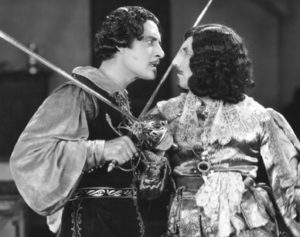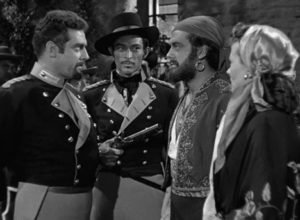Bardelys the Magnificent
Bardelys the Magnificent
Rating: ***
Origin: USA,1926
Director: King Vidor
Source: Flicker Alley DVD

Here is another adaptation of an early novel by Rafael Sabatini, a book revived like The Sea Hawk in the wake of the worldwide success of Scaramouche. Its star, matinee idol John Gilbert, was riding high at the time, and was paired here with the hit-making director King Vidor, best known for The Big Parade and (much later) Duel in the Sun. The setting is France in 1632, midway through the reign of King Louis XIII, who is putting down the last major revolt of rebel Prince Gaston. Gilbert plays the Marquis de Bardelys, an elegant Paris playboy who excels at romantic conquest, his seductions fueling the gossip and petty scandals of the French Court. Bardelys is one of King Louis’s spoiled favorites, and rivals with another favorite, the supercilious Comte de Chatellerault (in a delicious mustache-twirling performance by Roy D’Arcy). When Chatellerault tries and fails to win the hand of a provincial heiress, Bardelys mocks him, and is then maneuvered into accepting a challenge to win her himself—much to the displeasure of the king, played with epicene preciosity by Arthur Lubin. Against the royal wishes, Bardelys sets off into rebellion-torn Languedoc to win the hand of Roxalanne de Lavedan, whom he’s never even met.
Complications ensue, and after a couple of far-fetched coincidences, Bardelys ends up recovering from wounds in the Château de Lavedan, but under an assumed name, that of a slain rebel and traitor. Once he meets Roxalanne, Bardelys finds himself in true love for the first time, but faced with wooing Mademoiselle de Lavedan under a false name while being hunted by royal troops. There follows a tangle of honor and dishonor, spies, jealous rivals, secret vows, betrayals, athletic escapes, and a fine climactic duel.
John Gilbert is genuinely charming and charismatic as Bardelys, and fortunately the smart and spirited Joan Boardman is cast opposite him as Roxalanne. They play well off each other, and their scenes together are the best in the film, especially the famous episode in which Gilbert woos her in a sun-dappled boat drifting through a long screen of trailing willow branches. Sadly, everyone else in the picture hams it up outrageously, which I guess we have to blame on King Vidor’s direction. One caveat: this film was thought lost for decades, until a single copy was discovered in Paris in 2006. It’s been magnificently restored except for several scenes in the middle of the film that had to be reconstructed from stills and the shooting script. That, and the fact that almost everything in this movie is strictly to formula, is what keeps it from being a four-star film. Lurid visual bonus: skull-faced priests with sinister pointy-cowled monkshood minions!
